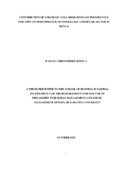| dc.description.abstract | Wholesale and retail sector is one of key sectors that are expected to help the government in realizing vision 2030. They are great contributors to employment and GDP. However, of late, wholesale and retail businesses have faced a myriad of challenges in a performance and dynamic environment. The purpose of the study therefore was to investigate contribution of strategic collaborations of motorcycle industry on performance of wholesale and retail sector growth in Kenya. The study was guided by five research objectives which were to examine the influence of motorcycles delivery innovation, logistic cost, timeliness, motorcycles accessibility to the markets and to examine the moderating effect of road safety and compliance training of motorcycle riders on the relationship between strategic collaboration of motorcycle industry and the performance of wholesale and retail sector in Kenya. The study was anchored on social exchange theory, Greiner’s Growth Model, Cost Leadership Strategy and neo-classical growth model. Descriptive research design was used. The study targeted all wholesales and retails shops in 47 counties in Kenya which employed commercial motorcycles for their last mile delivery of goods. Systematic sampling technique was employed to select the counties while in each County simple random sampling technique was employed to select a sample of 383 respondents. Closed ended questionnaire was used to collect quantitative data, while open ended questionnaire was used to collect qualitative data. Cronbach alpha was adopted to test the reliability of the data collection instruments. The questionnaires were self-administered to the respondents using a pick and drop method. Data analysis involved both quantitative (descriptive -frequencies, mean, standard deviation, percentages and inferential- Pearson correlation coefficient) and qualitative techniques where data was summarized in themes and presented in narrative form as well as raw data excerpts. The study achieved a response rate of 77.8% where a total of 298 out of 383 questionnaires were filled and returned back. The study findings indicated that motorcycle delivery innovation had been embraced by the wholesalers and retailers in their businesses resulting in improved performance. The study found that motorcycle logistics costs were low and manageable as compared to motor vehicles and this had helped the businesses realize more profits due to reduced cost of operations such as storage cost and distribution cost as well as improving the delivery time. The study further established that use of motorcycles by wholesalers and retailers had enhanced distribution of goods to the customers as well as reaching a wide range of customers hence improving customer satisfaction and customer retention. The study revealed that motorcyclists engaged by the wholesalers and retailers had been trained on road safety and they were all compliant with NTSA rules. The study concluded that delivery solution strategies, logistic cost, timeliness of motorcycles and their accessibility contributed to positive performance of the businesses. The study concluded that logistic cost is inversely proportional to performance of wholesale and retail businesses. The study concluded that road safety and compliance training of motorcycle riders had a significant moderating effect on the relationship between strategic collaboration of motorcycle industry and performance of wholesale and retail sector in Kenya. The study recommended that the government should embrace the use of electrical motorcycles as innovative delivery solution to help reduce pollution caused by increased use of petrol motorcycles. The study further recommended that the government should design specific lanes for commercial motorcycles especially in Nairobi to help increase their accessibility to the central businesses district to help promote wholesale and retail businesses in major towns. | en_US |
